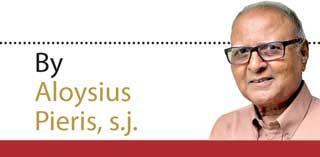Reply To:
Name - Reply Comment

 The circumstances which surrounded the very first Christmas can teach us the art of expressing our joy with songs and psalms, with carols and chants, even in the midst of socio-political uncertainties that beset our nation.
The circumstances which surrounded the very first Christmas can teach us the art of expressing our joy with songs and psalms, with carols and chants, even in the midst of socio-political uncertainties that beset our nation.
To learn this exquisite art of maintaining a calm and cheerful mood amidst a chaotic situation, we are now going to listen attentively to Mathew and Luke, the only two gospel writers who give us a glimpse into the first Christmas, for they both make certain political innuendos which throw some light on how to celebrate Christmas in the thick of a national crisis. Remember that the Holy Land too was in a mess at the time of our Savior’s birth.
Mathew describes the first Christmas against the politics of King Herod under whose immediate jurisdiction Jesus chose to be born, whereas Luke contrasts the credentials of the King of Kings with the dubious claims of Emperor Augustus in whose vassal country this earth-shaking birth took place.
Let us meditate on what these two evangelists tell us about the first Christmas and indirectly about our Christmas in this country.
Fourthly, the sense of insecurity that grips the hearts of power-thirsty rulers could make them violently aggressive. The cobra stings if threatened; the dog bites through fear. This cowardly politician, Herod, resorted to brutal violence to get rid of his real or putative rivals, those whom he imagined were a threat to his throne
Let me begin with Mathew, who presents the first Christmas as a study in contrast between two types of leaders: Herod who craved to be served and Jesus who came to serve.
My first observation is that this crude politician called Herod has been described by his contemporaries as well as by modern historians as a power-hungry megalomaniac, shamelessly dependent on the support of a foreign imperial power (that of Rome) to keep his political grip over the people. He was a stooge of another country, a powerful country which, through him, kept his own nation under subjugation.
Secondly we learn from historical records that Herod was involved in a massive development programme, including the construction of the port city at Caesarea Maritima…. not so much to serve the people as to have the people eventually support and serve him. He was cunning enough to start this construction project by rebuilding the Holy Temple of Jerusalem, even calling it “Herod’s Temple”. Crafty politicians buy the allegiance of the clergy by spending the people’s money on Religious Institutes.
Surely it was not out of love for God that Herod built the Temple; it was to win over the Clergy and through them the credulous masses. The notorious High Priest openly supported this Tyrannical Ruler instead of keeping in touch with the True Deliverer born in Bethlehem, just five miles from that Temple of Jerusalem. The infant saviour was so close to him physically but so distant from his clerically ambitious heart.
Among the disappearances recorded during his reign of terror were some of his family members, while his failed attempt to eliminate Jesus resulted in the cold-blooded murder of the innocent sons of innocent mothers
Of course, the real temple where the Lord dwelt was that Manger, where our meek and humble King was born not to erect buildings but to build up a community of love, a peoplehood in which, as St Paul puts it, there should be no discrimination between male and female (gender), between Jew and gentile (ethnicity) and between free and slave (class).
Thirdly, Herod, like every power-hungry politician, lived in mortal fear ⎯of losing his political supremacy over the masses. Historians tell us that this coward of a ruler lived in such dread that he employed two thousand body-guards, whereas Jesus, our King was surrounded, not by soldiers, but by unarmed simple shepherds and their sheep, his foster father (an ordinary wood-worker) and his mother (a simple village girl).
What a contrast! The manger was all cheer and no fear. There was angelic music in the air. This King of ours was not afraid to be born dangerously close to the residence of the enemy who was plotting his death. For Bethlehem was only a half-hour’s horse-ride from Jerusalem. Heavenly joy was challenging human cowardice. That is what Christmas means. It tells us never to renounce our joy because of political crises. For we serve a King who is the author of peace and reconciliation.
Fourthly, the sense of insecurity that grips the hearts of power-thirsty rulers could make them violently aggressive. The cobra stings if threatened; the dog bites through fear. This cowardly politician, Herod, resorted to brutal violence to get rid of his real or putative rivals, those whom he imagined were a threat to his throne.
Among the disappearances recorded during his reign of terror were some of his family members, while his failed attempt to eliminate Jesus resulted in the cold-blooded murder of the innocent sons of innocent mothers. Do we realize that the first Christmas took place amidst nationwide panic and political turmoil? Let us, therefore, set aside fear and anxiety from our hearts and bear witness to the serenity of the first domestic church, the Holy Family serenity, because Jesus was its centre.
Fifthly, Herod’s scandalous life of debauchery and sexual exploits saw him confined to a bed of atrocious pain during his last days, suffering from a humiliating social disease, gonorrhoea, rotting and smelling in his whole body. This politician was destined to suffer mentally and physically on account of his own despicable sins, whereas that other King, lying also in a foul-smelling stable, would also die one day in excruciating pain, but for other people’s sins. Christmas, dear friends, is a tale of two kings, clearly indicating where you and I belong, where our loyalties lie. This, then, is the message of the first Christmas: Not to let the politics of selfish rulers make us lose the peace and the joy that our King has come to bring about obviously not without our collaboration.
At the same time, dear friends in Christ, I see a red light flickering before me. We Christians must beat our breasts in shame and confess our sins in all humility; for in our thousand-year history, we have not always been faithful to Christianity’s peaceful origins. Christmas is an annual reminder of this bitter truth.
Let us now turn to Luke the Evangelist, a highly educated scholar who perceived the irony of “God-made-man” (Jesus Christ) confronting “a man-made god” (Augustus Caesar)! This Augustus Caesar called himself God, Divus Augustus and it was under his imperial rule that our Infant Saviour was born. This Emperor groomed his adopted son to succeed him on the throne….. to ensure a continuous family rule. This son was Tiberius who called himself the “son of god Augustus” (Filius Divi Augusti). Every Good Friday we are invited to watch the divine satire enacted in Jerusalem when the High Priest and Roman Governor invoked the imperial law of Tiberius, the adopted son of a pseudo-divinity, to assassinate the only begotten Son of God!
I like to pause a moment now to inquire from Luke how and why Augustus arrogated to himself a divine status. I suspect our evangelist might acknowledge that he was quite aware of the famous inscription in Greek known as the Priene Inscription of 06 BC in which Augustus, had posed himself as ‘God’, whose birth allegedly brings ‘Good News’ [evangelion] and marks a New Era in the world calendar because he had terminated warfare and brought calm and order (i.e, peace) to his realm. Luke’s account of the birth of Jesus seems to turn this farcical claim into an empty boast, for according to this evangelist the one and only true God has sent heavenly choirs to announce that Her divine Son has landed on our planet amidst poverty and squalor…… born into a worker’s family and of a peasant mother, in order to end all wars and bring true peace to all people of Good Will. No war has ever brought about lasting peace in the world’s history, and never will; nor in our own experience has politics been so pacific as to ensure peace among every sector of our nation.
Christmas is about peace emanating from a vulnerable little child! That is why, dear sisters and brothers, in the face of threats of violence and bloodshed looming in the horizon, this Child, after growing “in age grace and wisdom”, did his peace-walks through the length and breadth of his country and challenged the very powers that tried to eliminate him, powers that temporarily succeeded in causing his disappearance only to be disappointed by him re-appearing and empowering us with his own Spirit whose nature is Love and uttering these re-assuring words: “Peace be with you”. This peace was won at the cost of his own life and not by inflicting death on others as in a war. This is the very Peace promised at the first Christmas night, the Peace that he poured upon us when he sent his Spirit, the Peace that we are singing about and wishing each other today.
Let me now conclude article with words taken from Chapter Three of the book of Prophet Zephaniah, verses 14 onwards, which you have heard a while ago this evening as the First Reading of today’s Mass. These words too were uttered during a convulsive national crisis in Israel in the 7th century BC, when power-drunk politicians and politicized clergy had created a chaotic situation for the people. It was in such an ethos that God tells us repeatedly these encouraging words, “rejoice, sing aloud, exult with all your heart” (v.14); which means “Continue with your carol service”. Why? Because “the Lord your God is in your midst” (v.17), and what does God say living in our midst? “Fear not” (v.16). Why? Because “he will deal with the oppressors” (v.19).
This is why Zephaniah assures us that God Herself is singing with us in joy (v.17). Yes, dear brothers and sisters, the prophet proclaims that God is here joining us in singing carols, dispelling fear and promising to deal with oppressors.
Let me now sum up today’s Christmas message:
Mary’s Boy Child is the Prince of Peace who is in our midst with a promise to deliver us from violence and oppression, not with weapons of war but with disarming love, not alone but with all People of Good Will, obviously expecting us to be among them. Let us proclaim this message not only in the songs that we sing but also in the lives that we live.
Amen. I wish you all a Christ-ful Christmas !